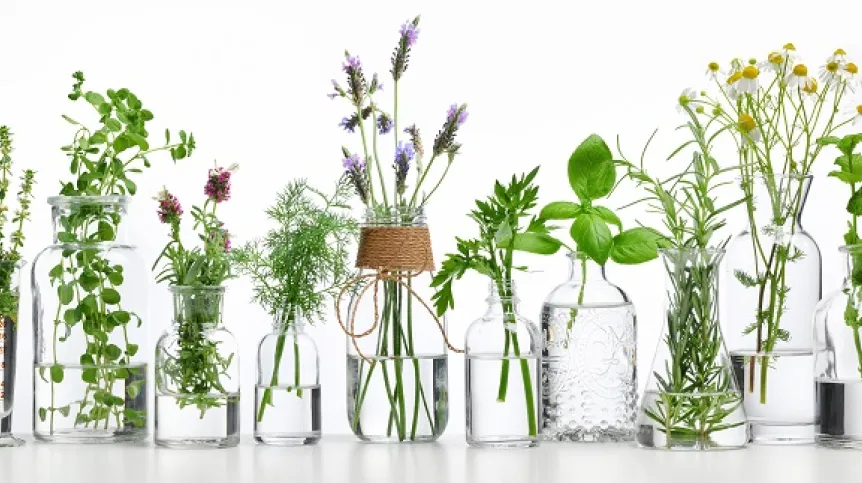
Scientists from the Wrocław University of Science and Technology tested 500 essential oils and aromatic extracts to verify their potential in the treatment of SARS-CoV-2 infection. A few promising formulations will be subject to further research.
The new research by Professor Marcin Drąg's team from the Wrocław University of Science and Technology was presented in Scientific Reports.
Professor Marcin Drąg is a laureate of the FNP Prize. His team was the first in the world to work out the enzyme key to the development of the SARS-CoV-2 virus - the SARS-CoV-2 Main Protease (Mpro). Scientists from his group also showed the structure of the skeleton of the future COVID-19 drug that would inhibit this enzyme and prevent the virus from multiplying. One of the components identified by the Polish team was used in Pfizer's drug.
Using knowledge about the development and blocking the coronavirus, Professor Marcin Drąg began looking for formulations that would act as inhibitors (blocking substances) of those proteases important for the coronavirus.
In collaboration with Dr. Daniel Strub from the Wrocław University of Science and Technology, a natural products expert, the researchers investigated... essential oils and aromatic extracts. Essential oils are products obtained from plants only by physical methods (by distillation with water steam/water or by extruding). Aromatic extracts are obtained as a result of the extraction process of materials of plant or animal origin (e.g. castoreum resinoid, beeswax absolute) with solvents. Both oils and extracts are usually complex mixtures of organic compounds. They are often used as fragrance or flavour additives.
In the publication in Scientific Reports, the researchers point out that during the COVID-19 epidemic, some manufacturers of essential oils praised their products for helping in the fight against SARS-CoV-2. The sales of certain fragrance and flavour formulations of natural origin increased during the COVID-19 epidemic. However, there was no scientific evidence that any essential oils could protect against COVID-19. At the same time, no one tried to show that using oils did not make sense.
That is why the team from the Wrocław University of Science and Technology took a look at this huge and diverse group of substances and checked whether various extracts obtained from plants could somehow inhibit the development of the SARS-CoV-2 virus. The scientists tested over 500 essential oils and extracts. They checked if any of them would block at least one of the two proteins crucial for the development of SARS-CoV-2 coronavirus. In other words, they were looking for a COVID-19 drug among compounds of natural origin.
The vast majority of the tested oils did not exhibit any interesting actiivity. However, it turned out that among these hundreds of substances there were several oils and extracts that had the potential to block the multiplication of the pathogen. Among them was petitgrain mandarin essential oil. It was even shown which compound found in the oil inhibited the coronavirus enzyme. The action of some resinoids used in incense and the food industry also turned out to be noteworthy.
These extracts - at least at the stage of laboratory tests - inhibited the activity of proteases specific to the coronavirus. The results have been confirmed on a cell line, but the formulations have not been tested on animals, not to mention humans. So there is a very long way to determine whether they would actually help in the event of a real SARS-CoV-2 infection.
Professor Drąg said: “None of the extracts we have tested is a medicine. We only indicate research directions and ways to test the action of various extracts of natural origin.”
He added, however, that if it turned out that one of the essential oils actually worked, this would be good news. Maybe it would be possible to, for example, easily produce by a mouthwash that would block the development of coronavirus in those infected or exposed to infection. However, many expensive tests are still needed to confirm the effectiveness and safety of such a solution.
Professor Drąg told PAP that in the work on essential oils, his team was inspired by the study of the Chinese researcher Tu Youyou, who tested hundreds of recipes used in traditional Chinese medicine and checked if any of those formulations could really help in the fight against malaria. It turned out that a sweet wormwood preparation indeed helped in the treatment of malaria.
Thanks to further research, artemisinin was obtained, from which a malaria drug was produced. This drug saved the lives or helped in the recovery of millions of people, and its discoverer was awarded the Nobel Prize in 2015.
PAP - Science in Poland, Ludwika Tomala
lt/ zan/ kap/
tr. RL













